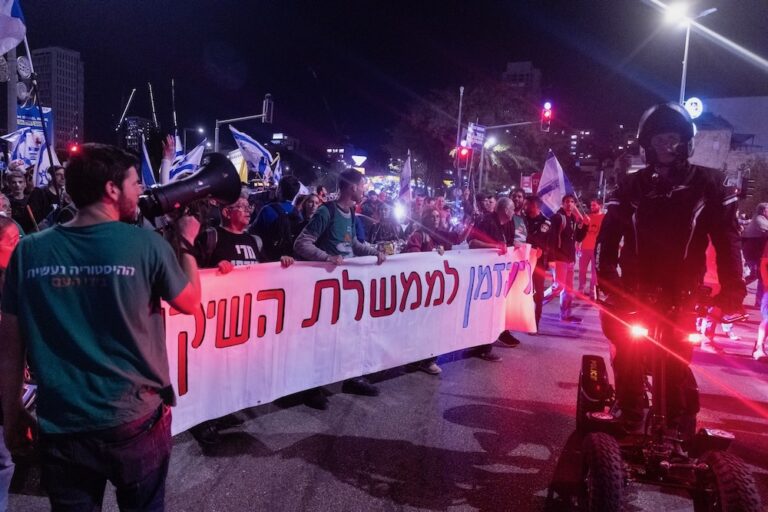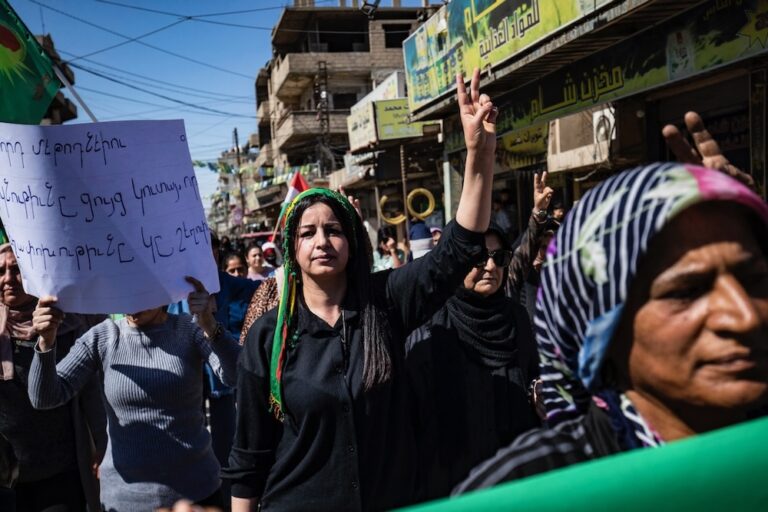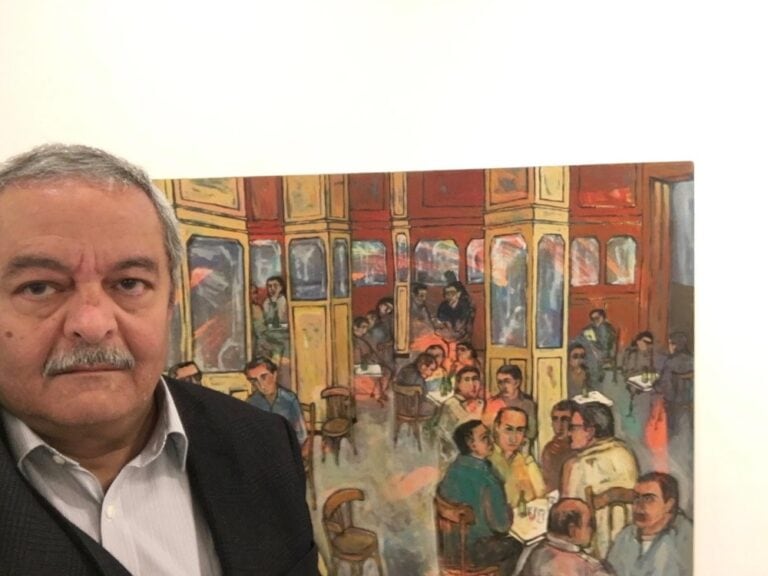(CPJ/IFEX) – The following is a CPJ press release: CPJ Honors Journalists with International Press Freedom Awards For Courage in Reporting the News “60 Minutes” Executive Producer Don Hewitt Also Honored at November 23rd Event New York, NY, Oct. 20, 1999 – The Committee to Protect Journalists (CPJ) will present its 1999 International Press Freedom […]
(CPJ/IFEX) – The following is a CPJ press release:
CPJ Honors Journalists with International Press Freedom Awards For Courage
in Reporting the News
“60 Minutes” Executive Producer Don Hewitt Also Honored at November 23rd
Event
New York, NY, Oct. 20, 1999 – The Committee to Protect Journalists (CPJ)
will present its 1999 International Press Freedom Awards to five
journalists – from Colombia, Cuba, Kosovo and Pakistan – for their courage
and independence in reporting the news. The honorees, who have been beaten,
jailed, or had their lives threatened because of their work, will receive
the awards at a formal dinner ceremony at the Waldorf-Astoria in New York
City on Tuesday, November 23rd.
The winners of the Ninth Annual International Press Freedom Awards are:
Jesús Joel Díaz Hernández, who is serving a four-year prison sentence in
Cuba for starting an independent news agency; Baton Haxhiu, editor of
Kosovo’s leading independent newspaper, Koha Ditore, which he continued to
publish from exile after eluding Serbian police; Jugnu Mohsin and Najam
Sethi, publisher and editor of The Friday Times in Lahore, Pakistan. Last
spring Sethi was beaten, abducted and jailed after the paper published
charges of government corruption; María Cristina Caballero, a reporter for
Colombia’s Semana, who received frequent death threats as a result of her
work covering the country’s escalating civil war.
CPJ will also honor CBS “60 Minutes” Executive Producer Don Hewitt with the
Burton Benjamin Memorial Award for a lifetime of distinguished achievement
in the cause of press freedom.
In announcing the awards, CPJ Board Chairman Gene Roberts said, “The awards
not only honor these five courageous journalists who faced jail, physical
harm and even death, simply for doing their work, they shine light on the
enemies of press freedom and democracy in many areas of the world.”
Speakers at the event will include: NBC News anchor Tom Brokaw, who will
once again host the awards ceremony, Maureen Dowd of The New York Times,
Clarence Page of The Chicago Tribune, David Remnick of The New Yorker, and
Ray Suarez of “The NewsHour with Jim Lehrer.”
Norman Pearlstine, Editor-in-Chief of Time Inc., will be chairman of this
year’s black-tie dinner. This year’s dinner vice-chairs are: former talk
show host Phil Donahue, The Coca-Cola Company Chairman and CEO M. Douglas
Ivester, and the Freedom Forum Chairman and CEO Charles L. Overby.
CPJ Executive Director Ann K. Cooper said, “While we in America sometimes
take press freedoms for granted, the hardships endured by these courageous
journalists remind us that there are many places in the world where basic
press freedoms simply don’t exist. Because the threats these journalists
stand up to are ultimately threats to all of us, we are deeply indebted to
them.”
Following is information about the 1999 CPJ International Press Freedom
Award winners and the Burton Benjamin Memorial Award recipient:
María Cristina Caballero, Colombia
When reporter María Cristina Caballero walks down the streets of Cambridge,
Mass., she still looks over her shoulder. She fled to Cambridge from her
home in Bogotá, Colombia after finding a death threat on her answering
machine one day last spring. She had reason to be afraid. Four journalists
were murdered in the line of duty in Colombia in 1998, and Caballero had
made enemies all around, having interviewed all sides in the conflict that
is tearing her country apart – including drug traffickers, guerilla leaders,
and the leader of the right-wing paramilitary United Self Defense Forces of
Colombia (AUC).
For Caballero, universal access means more than getting scoops. It’s about
helping to create an environment in which peace is possible. In a country
where violence is rapidly destroying a great journalistic tradition – 45
Colombian journalists have been killed since 1988 – she argues that
Colombia’s best hope for peace is a free and unfettered press that can
provide a forum for dialogue and discussion. Caballero is on leave from her
job as investigative editor for the weekly Semana to write a book about the
Colombian civil war.
Jesús Joel Díaz Hernández, Cuba
Jesús Joel Díaz Hernández was arrested on January 18, 1999, convicted the
next day of “dangerousness” and sentenced to a four-year prison term. He was
held in solitary confinement for eight months. His crime: founding an
independent news agency.
Díaz Hernández is one of a number of independent journalists in Cuba who
show great courage, tenacity and cunning in the inventive use of the
Internet to circumvent censorship and confront President Fidel Castro’s
systematic campaign to suppress free expression. They dictate stories over
the phone to colleagues abroad for posting on websites, where they are
picked up by newspapers in the United States and Europe and sometimes
broadcast back to Cuba.
This past spring, the Cuban government ratcheted up its assault on
independent journalism by passing a law that criminalizes free speech and
forbids contact with foreign media.
In prison, Díaz Hernández, 25, has continued to write, although guards have
confiscated his stories and threatened him with up to 20 more years of jail.
Baton Haxhiu, Kosovo
As editor in chief of the Pristina daily Koha Ditore, Baton Haxhiu helped
turn the paper into a provocative source of news and analysis, focusing a
critical spotlight on every key player in the Kosovo quagmire. His editorial
stands have angered Serb authorities, Western diplomats and rival Kosovar
Albanian leaders alike.
Such journalism came at a price: before the NATO air strikes, Haxhiu endured
two years of Serbian state harassment, including repeated police
interrogations. In March 1998, the paper’s Pristina offices were ransacked
and several staff members were roughed up. One year later, on the eve of the
NATO air strikes, Serb forces torched the paper’s offices, killing a guard.
Then word came from NATO that Serb forces had killed Haxhiu. The report was
incorrect: the editor had eluded the police and was hiding in a basement.
But when he heard the report of his own death over short-wave radio, Haxhiu
fled to Macedonia. There, he resumed publication of Koha Ditore,
distributing the paper to refugees.
Now back in Kosovo, Haxhiu is still a target for people who disagree with
his hard-hitting coverage. Most recently, the press agency linked to the
Kosovo Liberation Army denounced him as a traitor. Haxhiu has received
numerous death threats as a result.
Najam Sethi and Jugnu Mohsin, Pakistan
Najam Sethi and Jugnu Mohsin – the husband and wife team that runs The
Friday Times – are journalistic heroes in Pakistan. Mohsin, the publisher,
and her husband Sethi, the chief editor of the weekly paper, fought to
assert freedom of the press in the face of the recently-deposed Sharif
government’s increasingly brutal efforts to control the media. Last May,
Sethi was dragged from his bedroom in the middle of the night by government
agents who beat him, gagged him and then held him without charge for nearly
a month.
During her husband’s imprisonment, Jugnu Mohsin courageously refused to
succumb to official intimidation. She continued to put out The Friday Times
while waging a campaign to learn Sethi’s whereabouts and win his release.
The Friday Times is an equal opportunity offender that has locked horns with
Pakistan’s leaders since its inception ten years ago. The paper repeatedly
angered both former prime ministers Nawaz Sharif and Benazir Bhutto by
calling on them to answer corruption charges.
Sethi’s arrest galvanized the public and the local independent press, who
saw the Sharif government’s actions as a crude attempt to stifle political
dissent in Pakistan.
Don Hewitt, recipient of the Burton Benjamin Memorial Award, is the
legendary executive producer of “60 Minutes,” the most-watched news
broadcast in the history of television, and a 50-year veteran of CBS. He was
executive producer of “The CBS Evening News with Walter Cronkite,” and has
headed the team at “60 Minutes” since the program’s birth in 1968. Hewitt
invented the television news magazine format and pioneered the provocative,
hard-hitting style that for three decades has brought the show praise and
controversy.
When CBS created “60 Minutes II” earlier this year, one reviewer praised it
for being faithful to “the unmannered, straightforward, and yet highly
distinctive 60 Minutes” style perfected by series creator Don Hewitt: no
spurious visuals . no gimmicky graphics . and writing and reportage of the
highest standard.”
Hewitt, who is portrayed in the movie “The Insider,” about CBS management’s
controversial decision not to air a “60 Minutes” interview with a tobacco
industry whistle-blower, has stated that he could have resigned to protest
management’s action, but chose instead “to live to fight another day.”
He continues to be outspoken about the corrosive effect that the
corporatization of television news has had on press freedoms.
The Burton Benjamin Memorial Award honors the late CBS News senior producer
and former CPJ chairman who died in 1988.
For more information about each award winner, and for information about the
work of CPJ, including information about attacks on journalists worldwide,
visit CPJ’s website at http://www.cpj.org or call 212-465-9344 ext. 105.
The Committee to Protect Journalists is a nonpartisan, nonprofit
organization dedicated to the defense of press freedom everywhere.


